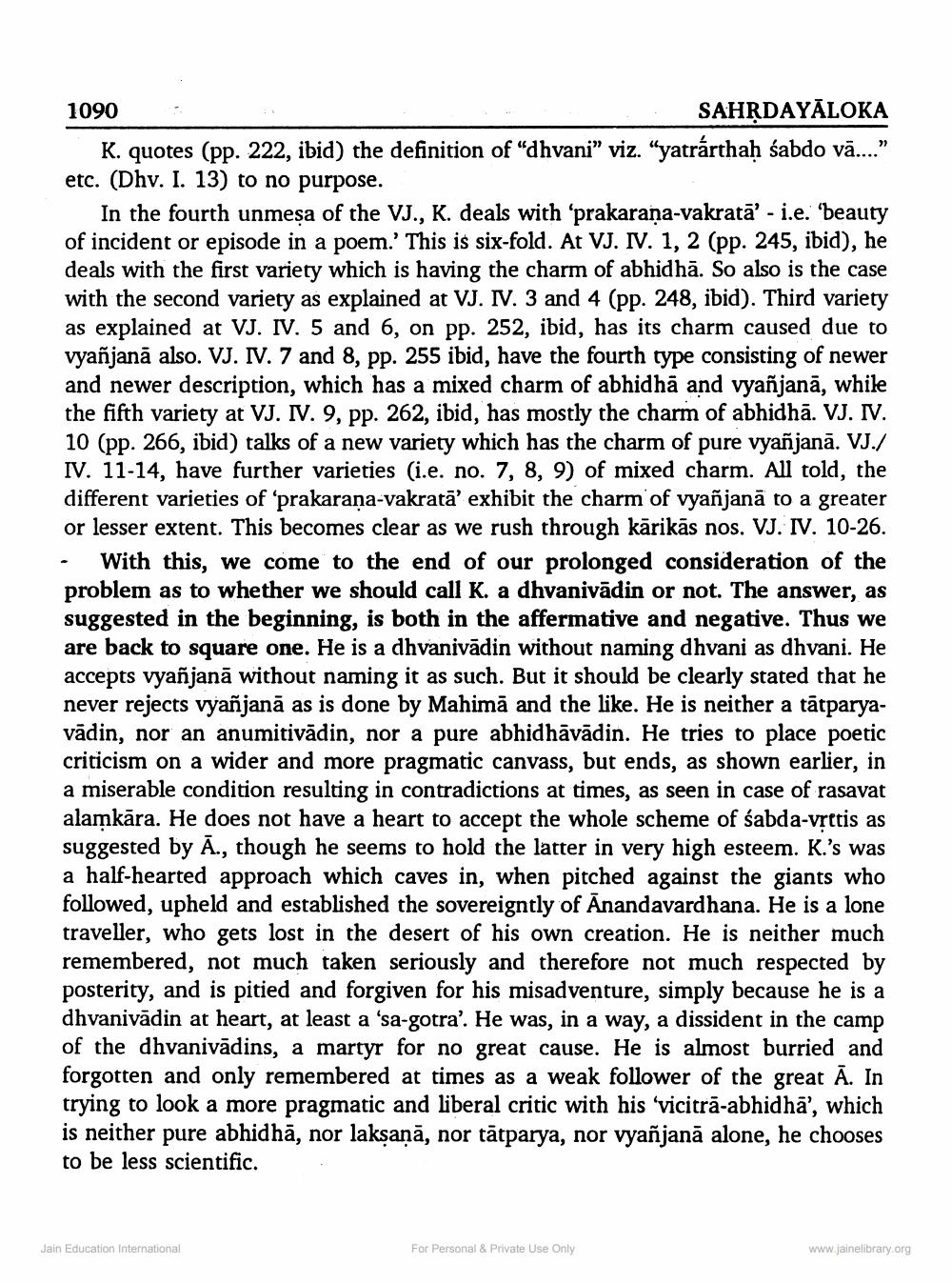________________
1090
SAHRDAYĀLOKA K. quotes (pp. 222, ibid) the definition of "dhvani" viz. “yatrárthah sabdo vā..." etc. (Dhv. I. 13) to no purpose.
In the fourth unmeşa of the VJ., K. deals with 'prakaraña-vakratā' - i.e. 'beauty of incident or episode in a poem.' This is six-fold. At VJ. IV. 1, 2 (pp. 245, ibid), he deals with the first variety which is having the charm of abhidhā. So also is the case with the second variety as explained at VJ. IV. 3 and 4 (pp. 248, ibid). Third variety as explained at VJ. IV. 5 and 6, on pp. 252, ibid, has its charm caused due to vyañjană also. VJ. IV. 7 and 8, pp. 255 ibid, have the fourth type consisting of newer and newer description, which has a mixed charm of abhidhã and vyañjanā, while the fifth variety at VJ. IV. 9, pp. 262, ibid, has mostly the charm of abhidhā. VJ. IV. 10 (pp. 266, ibid) talks of a new variety which has the charm of pure vyañjanā. VJ./ IV. 11-14, have further varieties (i.e. no. 7, 8, 9) of mixed charm. All told, the different varieties of 'prakarana-vakratā' exhibit the charm of vyañjanā to a greater or lesser extent. This becomes clear as we rush through kārikās nos. VJ. IV. 10-26. . With this, we come to the end of our prolonged consideration of the problem as to whether we should call K. a dhvanivādin or not. The answer, as suggested in the beginning, is both in the affermative and negative. Thus we are back to square one. He is a dhvanivādin without naming dhvani as dhvani. He accepts vyañjanā without naming it as such. But it should be clearly stated that he never rejects vyañjanā as is done by Mahimā and the like. He is neither a tātparyavādin, nor an anumitivādin, nor a pure abhidhāvādin. He tries to place poetic criticism on a wider and more pragmatic canvass, but ends, as shown earlier, in a miserable condition resulting in contradictions at times, as seen in case of rasavat alamkāra. He does not have a heart to accept the whole scheme of sabda-vretis as suggested by Ā., though he seems to hold the latter in very high esteem. K.'s was a half-hearted approach which caves in, when pitched against the giants who followed, upheld and established the sovereigntly of Anandavardhana. He is a lone traveller, who gets lost in the desert of his own creation. He is neither much remembered, not much taken seriously and therefore not much respected by posterity, and is pitied and forgiven for his misadventure, simply because he is a dhvanivādin at heart, at least a 'sa-gotra'. He was, in a way, a dissident in the camp of the dhvanivādins, a martyr for no great cause. He is almost burried and forgotten and only remembered at times as a weak follower of the great Ā. In trying to look a more pragmatic and liberal critic with his 'vicitra-abhidhā', which is neither pure abhidhā, nor laksanā, nor tātparya, nor vyañjanā alone, he chooses to be less scientific.
Jain Education International
For Personal & Private Use Only
www.jainelibrary.org




